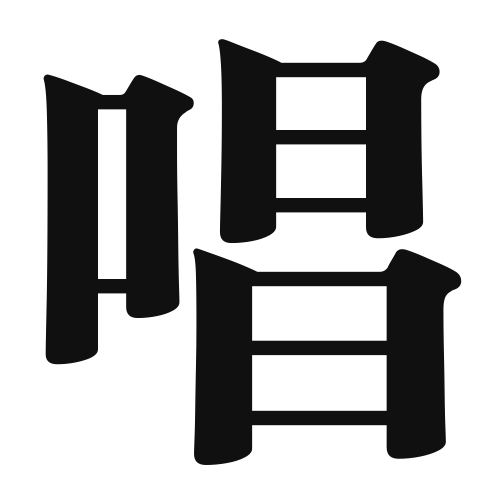1. Overview of Meaning
The kanji “唱” (shou) primarily means “to chant” or “to recite.” It is often associated with singing, calling out, or proclaiming something, especially in a formal or ritualistic context.
2. Formation and Radical
The kanji “唱” is a phono-semantic compound (形声文字), which means it is composed of a phonetic component and a semantic component. The left part, “口” (kuchi), represents “mouth,” indicating the action of speaking or chanting, while the right part, “昌” (shou), contributes to the pronunciation and adds a meaning related to flourishing or prosperity.
The radical of “唱” is “口” (kuchi), which is commonly associated with actions related to the mouth, such as speaking, eating, or singing.
3. Examples of Usage
Common words and phrases that include “唱” are:
- 唱歌 (shouka) – singing
- 唱和 (shouwa) – to chant together
Example sentence in daily conversation:
「彼は毎朝、歌を唱えます。」(Kare wa mai asa, uta o tonaemasu.) – “He chants a song every morning.”
4. Synonyms and Antonyms
Similar kanji with related meanings include:
- 歌 (uta) – song; while “唱” emphasizes the act of chanting or reciting, “歌” refers more to the song itself.
- 詠 (ei) – to recite poetry; this focuses on the recitation aspect, often in a more literary context.
Antonyms include:
- 黙る (damaru) – to be silent; this represents the opposite action of speaking or chanting.
5. Cultural and Historical Background
The kanji “唱” has significant ties to Japanese culture, particularly in religious and ceremonial contexts where chanting is a common practice, such as in Buddhist rituals.
Proverbs and idiomatic expressions that include “唱” often reflect the importance of voice and expression in Japanese culture. For example, the phrase 「声を大にして唱える」 (koe o dai ni shite tonaeru) means “to proclaim loudly,” emphasizing the act of making one’s voice heard.
